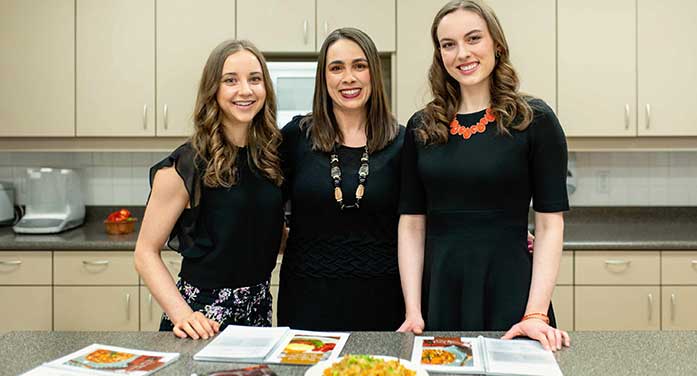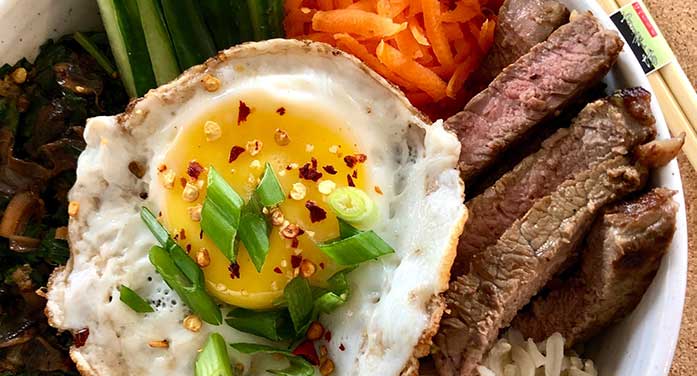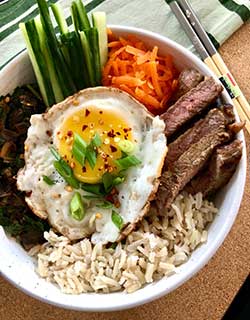
Hillary Wilson, Carla Prado, and Anissa Armet stand in front of a dish from the new cookbook (Photo: Dawn Graves)
A new cookbook to boost protein for patients with cancer – and everyone else – is being served up by University of Alberta nutrition experts.
The High Protein Cookbook for Muscle Health During Cancer Treatment, designed to help people with the disease get enough of the essential nutrient to maintain healthy muscle mass, is stuffed with healthy, tasty and easy recipes.
“Cancer often leads to muscle loss at an accelerated rate, so we chose recipes that have a high percentage of calories from protein so people can optimize their diet,” says Carla Prado, a nutrition expert in the Faculty of Agricultural, Life & Environmental Sciences (ALES) and one of three authors of the non-profit, free cookbook.
| READ MORE |
| Animal-based protein recommended for people being treated for cancer By Bev Betkowski |
| Regular exercise, healthy diet could improve odds of surviving cancer By Adrianna MacPherson |
| New evidence shows cancer is not as heritable as once thought By Adrianna MacPherson |
The breakfasts, lunches, dinners and snacks have easily sourced ingredients and are quick and simple to make, to help anyone keep and build muscle mass.
“Higher protein intake would also benefit people interested in weight management, older adults who also have higher protein needs, and very active individuals. The cookbook is a resource that everyone at the table can enjoy,” says co-author Anissa Armet, a registered dietitian and PhD candidate in nutrition and metabolism at the U of A.
The cookbook can be downloaded for free and printed or ordered online from Amazon. It will also be made available on an app for people with chronic disease. Copies will be shared with patients at cancer treatment centres through Alberta Health Services as well as visitors to the U of A’s Human Nutrition Research Unit and ALES donors and alumni. Prado also plans to have it translated into Portuguese and Spanish.
She got the idea for a cookbook after getting one as a gift from a colleague that featured high-protein – but also high-calorie – recipes.
“Some patients need to gain muscle but not necessarily weight, so I thought, why not create a cookbook for them? It’s also a perfect match for research we are working on that focuses on increasing protein but not calories for patients with cancer.”
Work on the book began in 2017, led by Prado, Armet and third author Hillary Wilson, a registered dietitian and a medical student in the Faculty of Medicine & Dentistry.
The 66 featured recipes all contain meat, poultry, fish, dairy or eggs and are based on Canada’s food guide, which emphasizes eating a variety of foods. The recipes also reinforce the importance of eating animal-based protein, as opposed to just plant protein, to maximize muscle gain, Prado says.
“Animal proteins contain all nine essential amino acids, so they are considered a complete protein, and meat also contains creatine, a nutrient that helps promote muscle growth.”
Some of the recipes are also gluten and dairy-free, and the cookbook also offers food safety information on topics like storing leftovers.
A team of volunteers, including other registered dietitians and community members, also helped design and test the recipes. Prado dedicated the book to volunteer Julie Rohr, who designed and laid it out but passed away from cancer before it was published.
“She’d be very proud of how it came together and the impact it will have.”
The book also reinforces the idea of “food as medicine,” Armet says: “Nutrition really matters.”
Prado and her co-authors are offering a free virtual cooking class on July 5, where they will discuss the cookbook and healthy eating.
Funding for the cookbook was provided by a Campus Alberta Innovation Program Chair in Nutrition, Food and Health awarded to Prado. The project was also supported by the Faculty of Agricultural, Life & Environmental Sciences.
Carla Prado is a member of the Women and Children’s Health Research Institute, the Cancer Research Institute of Northern Alberta, the Alberta Diabetes Institute and the Alberta Transplant Institute.
Try a recipe from the cookbook: Steak Rice Bowl
One of nutrition expert Carla Prado’s favourite recipes is the Steak Rice Bowl (page 108), a savoury, protein-rich creation of grilled beef strips nestled on vegetables and served up with rice and a fried egg — two staples from Brazil, her native country.




It’s pretty misleading that the authors are discouraging plant-based proteins when there is evidence how protective plant-based diets are against cancer, not to mention WHO has declared red meat and processed meat Group 2a and Group 1 carcinogens, respectively.
Contrary to popular belief, all plant foods contain all amino acids. They are the original source of protein after all. See “Dietary Protein and Amino Acids in Vegetarian Diets—A Review” – “The claim that certain plant foods are “missing” specific amino acids is demonstrably false. All plant foods contain all 20 amino acids, including the 9 indispensable amino acids”
It’s not difficult to obtain enough protein with plant-based foods, and a Registered Dietitian can definitely help oncology patients meet their needs!